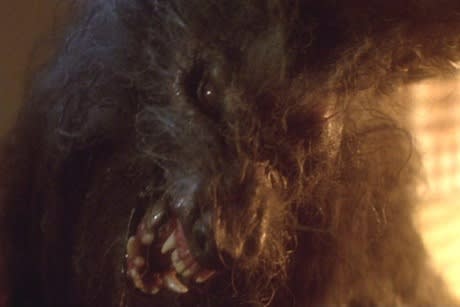Though noted for its groundbreaking werewolf transformation effects and spawning a series of unrelated sequels pertaining specifically to lycanthropes—and in one case, marsupials—Joe Dante's surprisingly sleazy and incisive tongue-in-cheer horror film, The Howling, used shape-shifting more-so as a metaphor or reverse MacGuffin than as a central mythological device. The overriding social criticism and exploration here is that of sensationalistic media and its tendency to desensitize the masses to worldly horrors and resultant animal instincts.
In the opening act, successful newscaster Karen White (Dee Wallace) goes undercover (in a way) to engage a man that has been stalking her for some time. The goal is to generate ratings by catching a predator or giving thrills to passive spectators demanding more risqué, controversial content from their news providers.
When the plan inevitably backfires and the producers lose contact with their star reporter, she's left in a private adult video booth with a serial killer and forced to watch rape and snuff videos of his previous victims. It's not a subtle indication of compounding thrills stemming from a desensitized cultural ethos, but it certainly gets its point across in an efficient manner with far more genuine discomfort than the impending third act werewolf storyline.
Oddly, this theme, while introduced didactically with borderline formal academic intent, takes the backseat almost entirely when Karen is instructed by a psychologist—helping her to cope with memory loss and shock following her attack—to go to a hippie-dippy healing retreat in the country with her husband William (Christopher Stone). It is here that howling noises in the middle of the night lead to an investigation by producers, or researchers, Terry (Belinda Balaski) and Chris (Dennis Dugan), into werewolf mythology, while William explores his animalistic side, hunting rabbits and engaging in violent, sexual situations with a woman living in a cabin in the woods (Elizabeth Brooks).
This examination of country life—as juxtaposed with seedy city passivity and unspoken indulgence—exists with a vacuum, working as a rather graphic monster film unto itself, before stepping back to the original media critique and indifferent audience reaction to visual proof of werewolves. Structurally, this tactic is quite fascinating unto itself, suggesting film theory subversion and subterfuge on the part of creature feature guru Joe Dante (Piranha, Gremlins).
It's just unfortunate that the handling of the werewolf "colony" wavers in logic with character reactions and motivations feeling sketchy at best. Even some of the terror sequences—such as one when a protracted werewolf transformation takes place—don't make much sense, with victims literally standing around to wait for their own death rather than fleeing or fighting back.
Still, the pre-Videodrome self-awareness and rather curt criticism of the viewing audience and their awareness of passive role is far more clever than the superficial elements of this campy, trashy horror film might suggest.
The Howling screens as part of the Birth of a Villain screening series at the TIFF Bell Lightbox on December 22nd, 2012 at 10pm.
(New World)In the opening act, successful newscaster Karen White (Dee Wallace) goes undercover (in a way) to engage a man that has been stalking her for some time. The goal is to generate ratings by catching a predator or giving thrills to passive spectators demanding more risqué, controversial content from their news providers.
When the plan inevitably backfires and the producers lose contact with their star reporter, she's left in a private adult video booth with a serial killer and forced to watch rape and snuff videos of his previous victims. It's not a subtle indication of compounding thrills stemming from a desensitized cultural ethos, but it certainly gets its point across in an efficient manner with far more genuine discomfort than the impending third act werewolf storyline.
Oddly, this theme, while introduced didactically with borderline formal academic intent, takes the backseat almost entirely when Karen is instructed by a psychologist—helping her to cope with memory loss and shock following her attack—to go to a hippie-dippy healing retreat in the country with her husband William (Christopher Stone). It is here that howling noises in the middle of the night lead to an investigation by producers, or researchers, Terry (Belinda Balaski) and Chris (Dennis Dugan), into werewolf mythology, while William explores his animalistic side, hunting rabbits and engaging in violent, sexual situations with a woman living in a cabin in the woods (Elizabeth Brooks).
This examination of country life—as juxtaposed with seedy city passivity and unspoken indulgence—exists with a vacuum, working as a rather graphic monster film unto itself, before stepping back to the original media critique and indifferent audience reaction to visual proof of werewolves. Structurally, this tactic is quite fascinating unto itself, suggesting film theory subversion and subterfuge on the part of creature feature guru Joe Dante (Piranha, Gremlins).
It's just unfortunate that the handling of the werewolf "colony" wavers in logic with character reactions and motivations feeling sketchy at best. Even some of the terror sequences—such as one when a protracted werewolf transformation takes place—don't make much sense, with victims literally standing around to wait for their own death rather than fleeing or fighting back.
Still, the pre-Videodrome self-awareness and rather curt criticism of the viewing audience and their awareness of passive role is far more clever than the superficial elements of this campy, trashy horror film might suggest.
The Howling screens as part of the Birth of a Villain screening series at the TIFF Bell Lightbox on December 22nd, 2012 at 10pm.
